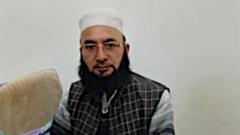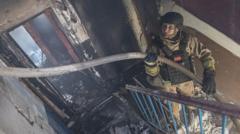A family in Indian-administered Kashmir is mourning the death of their loved one while battling lies spread by local media that branded him a terrorist.
Tragedy and Misinformation: The Agony of a Kashmiri Family

Tragedy and Misinformation: The Agony of a Kashmiri Family
The tragic narrative of a Kashmir family grappling with grief and false accusations highlights the darker side of media coverage in conflict zones.
Farooq Ahmed's brother, Mohammad Iqbal, lost his life on May 7 in cross-border shelling amidst a military conflict between India and Pakistan. Iqbal was a respected teacher at a madrassa in Poonch but was incorrectly labeled a terrorist by multiple media outlets after his death.
Following Indian airstrikes in Pakistan, tensions erupted in the region, leading to a series of violent escalations. This resulted in the tragic loss of 16 lives, including Iqbal's. As the Ahmed family faced the immense sorrow of losing a father to his eight children and husband to two wives, they were further devastated by media claims misrepresenting Iqbal's identity.
"You'd think the media would verify facts," Mr. Ahmed laments, pointing to the media’s portrayal based purely on his brother's appearance as a devout Muslim. The family only became aware of the claims after a relative forwarded a video on WhatsApp, which featured news channels inaccurately depicting Iqbal as a member of a terrorist organization.
In reaction to growing misinformation, the Poonch police issued a statement clarifying the truth about Iqbal’s demise, asserting his respected standing in the community and refuting any associations with terrorism. Yet, the damage was done, and the family felt crushed under the weight of public misconception.
Despite efforts to condemn the false narratives surrounding Iqbal, Mr. Ahmed questions why such charged labels were so quickly accepted, arguing for a deeper compassion and understanding for those grieving. He expressed frustration that most channels have failed to retract their erroneous claims or offer apologies, although one outlet, News18, was noted for its retraction.
Today, the Ahmed family is left to navigate life without Iqbal, who was their main breadwinner, and they now face financial uncertainty as they cope with their tragic loss. "Who will tell the world of our pain?" Ahmed asks. "To many, he's still a terrorist." As tensions between India and Pakistan persist, the story of this family stands as a sobering reminder of the responsibilities of media reporting in conflict.
Following Indian airstrikes in Pakistan, tensions erupted in the region, leading to a series of violent escalations. This resulted in the tragic loss of 16 lives, including Iqbal's. As the Ahmed family faced the immense sorrow of losing a father to his eight children and husband to two wives, they were further devastated by media claims misrepresenting Iqbal's identity.
"You'd think the media would verify facts," Mr. Ahmed laments, pointing to the media’s portrayal based purely on his brother's appearance as a devout Muslim. The family only became aware of the claims after a relative forwarded a video on WhatsApp, which featured news channels inaccurately depicting Iqbal as a member of a terrorist organization.
In reaction to growing misinformation, the Poonch police issued a statement clarifying the truth about Iqbal’s demise, asserting his respected standing in the community and refuting any associations with terrorism. Yet, the damage was done, and the family felt crushed under the weight of public misconception.
Despite efforts to condemn the false narratives surrounding Iqbal, Mr. Ahmed questions why such charged labels were so quickly accepted, arguing for a deeper compassion and understanding for those grieving. He expressed frustration that most channels have failed to retract their erroneous claims or offer apologies, although one outlet, News18, was noted for its retraction.
Today, the Ahmed family is left to navigate life without Iqbal, who was their main breadwinner, and they now face financial uncertainty as they cope with their tragic loss. "Who will tell the world of our pain?" Ahmed asks. "To many, he's still a terrorist." As tensions between India and Pakistan persist, the story of this family stands as a sobering reminder of the responsibilities of media reporting in conflict.



















